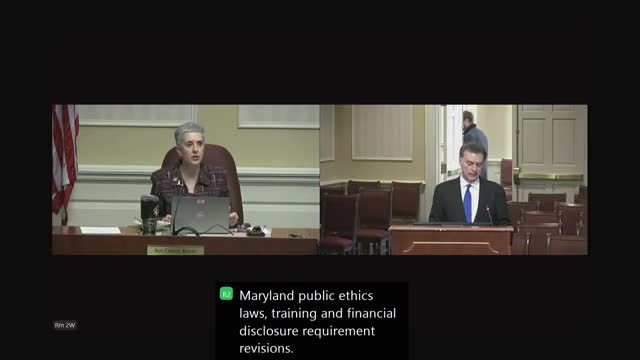State Ethics Commission seeks flexibility for training and expands disclosure language; committee holds hearing
Get AI-powered insights, summaries, and transcripts
Subscribe
Summary
Senate Bill 251, requested by the Maryland State Ethics Commission, would allow mandatory ethics training to be delivered online or live and replace "salaried employment" with "compensated employment" on financial disclosure forms; the committee held a hearing Jan. 15, 2025, but took no vote.
Senate Bill 251, departmental legislation requested by the Maryland State Ethics Commission, received a committee hearing Jan. 15, 2025, in the Education, Energy and the Environment and Elections Committee. The bill would remove a statutory reference to a specific two-hour duration for mandatory ethics training, allow the commission to provide training either online or through live sessions, clarify that all sources of “compensated employment” (rather than only “salaried employment”) must be disclosed on financial disclosure statements, and correct an existing statutory reference in the gift provision.
Jennifer Allgier, executive director of the Maryland State Ethics Commission, presented the bill and told the committee, “This legislation will not have any fiscal impact on the agency and also the, the small operational impact can be absorbed with existing agency resources so there's no cost to the state on this one.” Allgier said the change to training language recognizes the commission’s existing electronic training system while preserving the option for live, in-person or live virtual trainings aimed at mandatory filers, including state elected officials, employees required to file financial disclosure, and registered lobbyists.
Allgier described one substantive disclosure change in the bill: “This proposed legislation also clarifies that all sources of compensated employment should be disclosed on required financial disclosure statements.” She said the intent is to catch non-salaried but compensated work (for example, hourly work) so filers do not omit reportable income.
Senator Carozza asked whether the training changes would cover the annual meetings required for certain officials and said she preferred in-person sessions; Allgier responded that the commission can accommodate requests for in-person training while expanding availability via the online module. Senator Augustine pressed on the removal of the two-hour statutory benchmark, saying the time had acted as a “guardrail” and asking whether the commission might offer a minimal or insufficiently substantive module; Allgier replied that the commission’s online module covers the same content and that when the commission delivers live trainings it still typically schedules two-hour sessions to allow for questions.
Kate Thompson, staff counsel at the commission, was present to assist members with questions about filings. No committee amendments were offered at the hearing, and the committee did not take a vote on SB 251 during the session. The commission requested a favorable report and left the decision to the committee for further action.
If advanced, the bill would change statutory language about training delivery and financial disclosure terminology; implementation details such as training length and scheduling would remain within the commission’s administration and existing processes unless the General Assembly amends the statutory language further.
